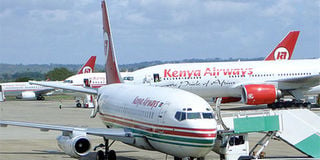Premium
Malfeasance shadows KQ-South African Airways partnership

KQ and South African Airways signed a partnership agreement to create a pan-African airline group in 2023.
In November 2021, at a ceremony in Johannesburg witnessed by President Uhuru Kenyatta and President Cyril Ramaphosa, Kenya Airways and South African Airways signed a partnership agreement to create a pan-African airline group in 2023 that will align their networks to complement each other.
Last week, after four years of work, the Zondo Commission, led by the acting chief justice of South Africa, released the first part of its report into state capture during the tenure of former President Jacob Zuma.
Some 447 pages of the report dealt with 10 years of management at South African Airways (SAA) and its associated companies.
It concluded that state capture happened at the institutions that were being run, not in the interests of the South African people but to benefit a few who wielded power inside and outside the company.
The commission found there was a steady decline in governance from 2012 when Duduzile Myeni was chairperson of SAA.
Myeni dismantled governance processes and created a climate of fear and intimation, leading to SAA making operational choices that led to the airline’s decline into a shambolic state.
Witnesses testified about how Myeni personally tried to change the terms of a plane lease deal with Airbus, led the reversal of an airport lounge management deal that has been won by Lufthansa, and skipped meetings with Emirates officials, causing embarrassment and scuttling a lucrative deal for SAA.
As chairperson, she directed that 30 per cent of contracts go to Black Economic Empowerment (BEE) enterprises, which she said was a government policy, but which was a misunderstanding of what President Zuma had said in a state of the nation speech.
She organised roadshows, and at a meeting with veterans, she said people who fought for the country were not interested in procurement procedures but the airline’s budget of fuel and if it could set aside 30 per cent of vacancies for their kids.
In one embarrassing case, a tier-one supplier to the airline was asked to set aside 30 per cent of its contract for BEE, yet it was 63 per cent black-owned and 25 per cent black-women-owned. All this happened even as the Treasury and the BEE commissioner at the Department of Trade wrote to tell the SAA board these actions were illegal.
Myeni enjoyed a close friendship with President Zuma and two different finance ministers tried but failed to remove her from her post. When some SAA directors complained about her behaviour, she ignored a meeting called by the finance minister to resolve the issues and started investigations to get the directors removed.
She prepared false whistleblower reports that were submitted through internet cafes to discredit staff and had state security officials confiscate the cell phones and laptops of managers as they entered meetings with her. President Zuma avoided the Zondo Commission hearings while Myeni was a difficult witness who refused to answer most questions so as not to incriminate herself.
The commission also noted how, from 2012 to 2016, the airline got clean audit reports from private audit firms. But after the treasury requested the auditor-general’s office to take over, they found corruption and fraud issues that led them to qualify the book of the airline and restate its finances.
They found they could not rely on previous audits because 40 per cent of staff were in acting positions, files had no supporting documents and concluded that SAA’s legal department was incapable of ensuring procurement processes were adhered to.
Another curious matter was with its South African Express subsidiary, which introduced new services to two airports. In a partnership agreement, the North West provincial government was to pay the airline 20 million rand and the airline would pay nearly the same amount to management companies to run the airports.
But this was found to be a siphon of cash as the service was not budgeted for and the contracts were inflated. As a result, the airline paid invoices for non-existent airport refurbishment, security and facilities management services with the payments ending up with airline and local government officials.
A lot of things were unearthed by Kenya’s Senate in 2015 when it looked into Kenya Airways (KQ), but the Zondo Commission had an unprecedented level of disclosure about airline mismanagement. KQ will now be a new chapter in the story of SAA and while President Ramaphosa is keen to put the state capture era behind him, part of its foundation is in the present.
Passenger and cargo, revenue sharing and contracts are issues that the airlines will have to grapple with as many South Africans still have an uneasy relationship with other African nations.
SAA resumed flights in December 2021 after over a year of Covid-driven shutdowns. To put behind its “shameful past” the interim SAA board has promised to implement all recommendations of the Zondo Commission, mainly by supporting the prosecution of the individuals named.
Myeni was declared a “delinquent director” for life, by a court in May 2020, barring her from sitting on any other boards.




